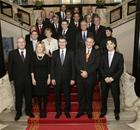New Year’s Promises in Croatia
Dessislava Dimitrova, January 4, 2012
 Croatia met 2011 with an arrested ex-prime minister, a cabinet reshuffle and several EU negotiation chapters to close before it. In the beginning of 2012, the former prime minister Ivo Sanader is at large, although the trial against him continues, his successor Jadranka Kosor was able to bring the EU talks to an end, but lost the elections and in the end the country welcomed 2012 having signed the accession treaty and with a new government, during whose mandate it would obtain a full membership.
Croatia met 2011 with an arrested ex-prime minister, a cabinet reshuffle and several EU negotiation chapters to close before it. In the beginning of 2012, the former prime minister Ivo Sanader is at large, although the trial against him continues, his successor Jadranka Kosor was able to bring the EU talks to an end, but lost the elections and in the end the country welcomed 2012 having signed the accession treaty and with a new government, during whose mandate it would obtain a full membership.
2011 started like this – New year, new government, new promises. The latter spread on a total of 62 pages. This is the content of the official programme of the new government, led by Zoran Milanovic, in which the cabinet’s main priorities by 2015 are  outlined. They are divided into 21 main areas, as the economy and the major economic policies come first for development in the next four years.
outlined. They are divided into 21 main areas, as the economy and the major economic policies come first for development in the next four years.
There are several footprints, on which the country’s economic development will be based. These are:
-gross domestic product (GDP) growth, based on new investments, increased output and competitiveness, industrialisation, exports and domestic demand;
- increase of budget revenues and adjustment of the costs to the country’s needs;
- investments in knowledge and education;
- removing corruption from all state bodies and developing a working judiciary system;
- tax reform;
- consolidation of public spending and decentralisation of revenues;
- improving the pension system;
“In the backlight of the serious economic crisis in Croatia, we need economic recovery and growth, new jobs and better distribution of the crisis burden, as well creating conditions for more revenues and higher living standard,” the government’s programme reads.
 Translated into numbers, the government targets a 5% economic growth by 2015, while at the same time it will work to cut unemployment and encourage industrial production, so that its share in the GDP increases and 50% of it goes for exports.
Translated into numbers, the government targets a 5% economic growth by 2015, while at the same time it will work to cut unemployment and encourage industrial production, so that its share in the GDP increases and 50% of it goes for exports.
A special accent is put on the ailing enterprises, whose liabilities excess the size of the their assets. For them a shorter insolvency procedure is planned, while their owners will be banned from setting up new companies in the meanwhile.
In order to finance key projects, the country will count on its development bank, as well on EU funds and loans from the World Bank, the European Investment Bank and the European Bank for Reconstruction and Development.
To boost the industry which, according to the programme, lacks the right policy, the government has pledged to solve the problems in the state-run railways as well in the shipbuilding sector and to point the key areas it wants to develop primarily – such as biotechnologies, especially pharmacy, and nanotechnologies. The new investments should go to four main areas: tourism, energy, infrastructure (where, unlike the case in  Bulgaria, the priorities are not new motorways, but railway and sea ports project), water and environment projects.
Bulgaria, the priorities are not new motorways, but railway and sea ports project), water and environment projects.
Under the programme, those four pillars of the future investments should increase the country’s GDP by average 2% to 4% annually. Besides, the government is set to bring the budget deficit to below 3% of its GDP, to cut the budget spending by 4.5% of GDP and lower public debt to below 60% of GDP.
At the same time the cabinet plans to launch a public administration reform as well as better management of state-owned assets. That is why a special body for their management, as state-owned companies, offering public services will not be sold.
Among the government’s priorities the one called “no corruption society” should be highlighted. In order to achieve this aim, the cabinet will mainly rely on the implementation of e-government.
The next four years will show whether the new government will be able to meet all of its tasks. The good thing about the programme is that it exists and at the end of its mandate the citizens will be able to ask Milanovic why something has been done or not.
 Bakir Izetbegovic, Andrej Plenkovic | © Council of the EU
Bakir Izetbegovic, Andrej Plenkovic | © Council of the EU Aleksandar Vucic, Recep Tayyip Erdogan | © Serbian Presidency
Aleksandar Vucic, Recep Tayyip Erdogan | © Serbian Presidency Jean-Claude Juncker, Zoran Zaev | © European Commission
Jean-Claude Juncker, Zoran Zaev | © European Commission